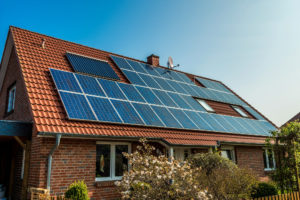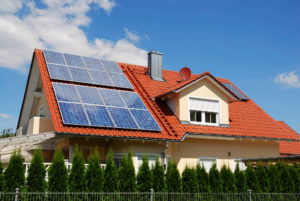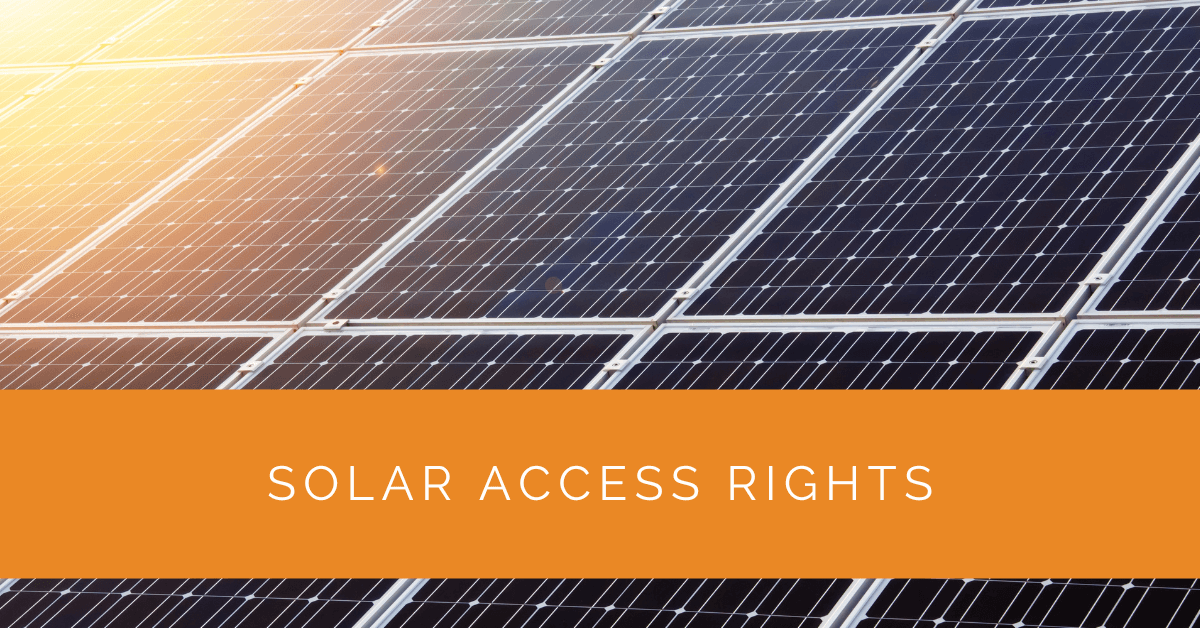Understanding solar access rights becomes crucial in an era where more homeowners are embracing solar energy. This article explores the significance of solar access laws and easements, empowering homeowners to install solar panels while navigating restrictions imposed by homeowner associations (HOAs) and protecting their solar access rights.
Contents
- 1 Key Takeaways
- 2 Solar Access Laws: An Overview
- 3 Homeowner Associations (HOAs) and Solar Access
- 4 Solar Easements: Protecting Solar Access Rights
- 5 State-by-State Solar Access Laws
- 6 Requesting Permission to Install Solar Panels
- 7 Ensuring Solar Rights for Homeowners
- 8 Case Study: Advocating for Solar Access Rights in a Residential Community
- 9 Expert Insights From Our Solar Panel Installers About Understanding Solar Access Rights Across the United States
- 10 Experience Solar Excellence with Us!
- 11 Conclusion
Key Takeaways
- Solar access laws and easements protect homeowners’ rights to install and utilize solar panels, ensuring a smooth transition to clean energy.
- Homeowner associations (HOAs) can pose challenges, but proactive communication and understanding can help homeowners navigate restrictions and advocate for solar access.
- Familiarizing oneself with state-specific solar access laws, obtaining necessary permissions, and advocating for solar rights empower homeowners to harness the benefits of solar energy.
Solar Access Laws: An Overview
Solar access laws are designed to protect the rights of homeowners to harness solar energy. These laws ensure that homeowners have the legal freedom to install and utilize solar panels on their properties without undue restrictions. By establishing clear guidelines and regulations, solar access laws encourage the widespread adoption of solar energy and support the transition to clean and renewable power sources.
Solar access laws vary across jurisdictions but generally focus on prohibiting unreasonable restrictions and discriminatory practices that hinder the installation and use of solar panels. They give homeowners the confidence and assurance that they can invest in solar energy systems without facing unnecessary obstacles. By promoting solar access, these laws play a vital role in advancing the adoption of sustainable energy practices and reducing dependence on fossil fuels.
Homeowner Associations (HOAs) and Solar Access
Homeowner associations (HOAs) govern residential communities and often have specific rules and regulations that homeowners must abide by. However, regarding solar installations, HOA restrictions can pose challenges for homeowners who want to go solar. Some HOAs may have aesthetic guidelines or architectural restrictions that limit the visibility or placement of solar panels, while others may outright prohibit solar installations.
Navigating HOA restrictions requires proactive communication and understanding of the HOA guidelines and relevant solar access laws. Homeowners can educate their HOAs about the benefits of solar energy, highlighting how it can contribute to a more sustainable community and increase property values. Engaging in open dialogue and addressing concerns can help foster a cooperative environment that supports solar access while respecting community guidelines.
Sometimes, homeowners may need to seek amendments to HOA covenants or agreements to allow for solar installations explicitly. This process often involves presenting a proposal to the HOA board and providing details about the solar system’s design, placement, and potential benefits to the community. By working collaboratively with the HOA and demonstrating solar energy’s economic and environmental advantages, homeowners can overcome potential roadblocks and secure solar access rights within their communities.

Solar Easements: Protecting Solar Access Rights
Solar easements are legal agreements that protect the solar access rights of property owners. They provide an enforceable framework for ensuring uninterrupted access to sunlight for solar energy systems. Solar easements typically involve granting or receiving a right to access sunlight over a specified period and at specific times of the day to avoid obstructions or shading from nearby structures or vegetation.
Establishing a solar easement involves the voluntary cooperation of neighboring property owners. The terms and conditions of the easement are typically outlined in a written agreement that specifies the duration, scope, and permissible uses. Solar easements can be a powerful tool for homeowners to protect their solar access rights, particularly in situations where neighboring properties may have the potential to shade or obstruct sunlight.
Enforcing a solar easement may involve legal recourse if a neighboring property owner violates the terms of the agreement. However, homeowners must consult legal professionals familiar with solar easements and local regulations to ensure the agreement is properly drafted and enforceable. By establishing and enforcing solar easements, homeowners can safeguard their solar access rights and protect the effectiveness and efficiency of their solar energy systems.
State-by-State Solar Access Laws
Solar access laws can vary significantly from state to state. Each state has regulations, provisions, and requirements impacting solar installations and homeowners’ rights. Homeowners need to familiarize themselves with the solar access laws in their respective states to ensure compliance and protect their solar access rights.
State-by-state solar access laws provide homeowners detailed information about the legal framework governing solar installations. They outline key provisions, such as restrictions on HOAs, zoning requirements, permit processes, and any financial incentives or rebates available for solar energy systems. Understanding their state’s specific solar access laws empowers homeowners to make informed decisions about installing solar panels and ensures compliance with local regulations.
By researching and understanding state-specific solar access laws, homeowners can navigate the legal landscape effectively, advocate for their rights, and maximize the benefits of solar energy in their communities. Keeping abreast of any updates or changes to these laws is also crucial to stay informed about emerging opportunities or potential challenges related to solar access.

Requesting Permission to Install Solar Panels
When homeowners decide to install solar panels, they may need permission from relevant authorities or entities. In the case of HOAs, homeowners should carefully review the association’s guidelines and procedures for requesting permission to install solar panels. This often involves submitting a formal request detailing the proposed solar system’s design, placement, and intended benefits.
To increase the likelihood of obtaining permission, homeowners can emphasize solar energy’s financial, environmental, and community benefits. Highlighting how solar panels can reduce energy costs, decrease carbon emissions, and enhance property values can help address potential concerns and garner support for the installation. Engaging in open and constructive communication with relevant authorities is key to navigating the permission process and securing approval for solar installations.
Homeowners must familiarize themselves with local regulations or permit requirements that may apply to their solar panel installation. By understanding the process and ensuring compliance with all necessary permits and documentation, homeowners can confidently proceed with their solar projects, knowing they have followed all the required procedures.
Ensuring Solar Rights for Homeowners
Ensuring solar rights for homeowners involves a multi-faceted approach encompassing education, advocacy, and collaboration. Homeowners can access various resources and organizations supporting solar access rights and clean energy initiatives. These resources provide valuable information, guidance, and tools to help homeowners understand their rights, navigate legal complexities, and effectively advocate for solar access within their communities.
Homeowners can actively participate in local and state-level initiatives that promote solar access and renewable energy adoption by staying informed and engaged. Engaging with legislators, attending public hearings, and joining local solar energy associations can help amplify the voice of homeowners and influence policy decisions that impact solar rights.
Furthermore, homeowners can share their experiences and success stories with others, demonstrating solar energy’s economic and environmental benefits. By raising awareness and fostering community dialogue, homeowners can inspire and encourage their neighbors to embrace solar power, creating a collective momentum for solar access and clean energy adoption.
Case Study: Advocating for Solar Access Rights in a Residential Community
Background
At Solar Panels Network USA, our mission extends beyond providing top-quality solar solutions; we also empower homeowners to navigate the complexities of solar access rights. One of our notable projects involved assisting a homeowner in a residential community governed by a strict Homeowner Association (HOA) to secure permission for a solar panel installation.
Project Overview
The homeowner faced significant challenges due to the HOA’s stringent guidelines, which included aesthetic restrictions and architectural rules that limited the visibility and placement of solar panels. Our role was to guide the homeowner through the process, ensuring compliance with solar access laws while addressing the HOA’s concerns.
Implementation
Initial Assessment and Legal Review
We began by conducting a thorough assessment of the HOA’s guidelines and the applicable state solar access laws. Understanding the central entity—the legal framework governing solar installations—was crucial. We identified the dominant search intent, which was to balance the homeowner’s right to install solar panels with the HOA’s aesthetic concerns.
Strategy Development and Communication
Our next step involved developing a strategy anchored in effective communication and legal compliance. We prepared a detailed proposal highlighting the financial, environmental, and community benefits of solar energy. This proposal served as the anchor text during discussions with the HOA board, creating a contextual bridge between the homeowner’s goals and the community’s guidelines.
Proposal Presentation and Negotiation
We facilitated meetings between the homeowner and the HOA, leveraging our knowledge domain to explain the technical aspects and benefits of solar installations. Using natural language processing and semantic role labeling, we framed our arguments to emphasize the holistic benefits, creating a contextual connection that resonated with the HOA board.
Establishing a Solar Easement
To further protect the homeowner’s solar access rights, we proposed the establishment of a solar easement. This legal agreement ensured that future developments or vegetation growth on neighboring properties would not obstruct sunlight, safeguarding the system’s efficiency and the homeowner’s investment.
Results
- Permission Granted: Through proactive communication and legal advocacy, the HOA granted permission for the solar panel installation, marking a significant victory for the homeowner.
- Increased Property Value: The successful installation not only reduced the homeowner’s energy bills but also increased the property’s market value, demonstrating the economic advantages of solar energy.
- Community Awareness: This project raised awareness within the community about the benefits of solar energy, encouraging other residents to consider similar installations and contributing to a broader adoption of renewable energy.
Summary
This case study highlights the importance of understanding and advocating for solar access rights. By navigating HOA restrictions, establishing solar easements, and leveraging state-specific solar access laws, homeowners can protect their right to harness solar energy. Our comprehensive approach ensured a successful outcome, showcasing the potential of solar energy to enhance property values and promote sustainability within residential communities.
Expert Insights From Our Solar Panel Installers About Understanding Solar Access Rights Across the United States
Navigating HOA restrictions can be challenging, but with clear communication and a solid understanding of solar access laws, homeowners can successfully advocate for their right to install solar panels.
Solar Policy Specialist
Establishing solar easements is a proactive step that ensures long-term solar access, protecting your investment from future developments or vegetation growth that could obstruct sunlight.
Senior Solar Installer
Understanding state-specific solar access laws is crucial for homeowners. It empowers them to make informed decisions and effectively advocate for their solar rights, ensuring seamless installation and optimal performance of their solar systems.
Solar Energy Consultant
Experience Solar Excellence with Us!
Trust in Solar Panels Network USA, where our seasoned experts deliver top-quality solar solutions for homes and businesses nationwide. With a legacy of countless successful installations and a commitment to sustainable energy, we’re your reliable partner in the solar journey. Ready for a brighter, eco-friendly future? Call us now at (855) 427-0058 and harness the power of the sun!
Conclusion
Understanding solar access laws, navigating HOA restrictions, establishing solar easements, being aware of state-specific regulations, and advocating for solar rights are all essential steps for homeowners who wish to embrace solar power. By taking proactive measures, homeowners can protect their solar access rights, contribute to a cleaner and more sustainable future, and enjoy the many benefits of renewable energy.
About the Author
Solar Panels Network USA stands at the forefront of solar energy solutions, driven by a team of seasoned solar engineers and energy consultants. With over decades of experience in delivering high-quality solar installations and maintenance, we are committed to promoting sustainable energy through customer-centric, tailored solutions. Our articles reflect this commitment, crafted collaboratively by experts to provide accurate, up-to-date insights into solar technology, ensuring our readers are well-informed and empowered in their solar energy decisions.

